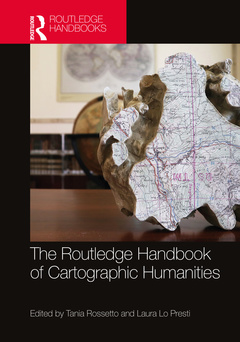The Routledge Handbook of Cartographic Humanities
Coordonnateurs : Rossetto Tania, Lo Presti Laura

The Routledge Handbook of Cartographic Humanities offers a vibrant exploration of the intersection and convergence between map studies and the humanities through the multifaceted traditions and inclinations from different disciplinary, geographical and cultural contexts.
With 42 chapters from leading scholars, this book provides an intellectual infrastructure to navigate core theories, critical concepts, phenomenologies and ecologies of mapping, while also providing insights into exciting new directions for future scholarship. It is organised into seven parts:
- Part 1moves from the depths of the humans?maps relation to the posthuman dimension, from antiquity to the future of humanity, presenting a multidisciplinary perspective that bridges chronological distances, introspective instances and social engagements.
- Part 2 draws on ancient, archaeological, historical and literary sources, to consider the materialities and textures embedded in such texts. Fictional and non-fictional cartographies are explored, including layers of time, mobile historical phenomena, unmappable terrain features, and even animal perspectives.
- Part 3 examines maps and mappings from a medial perspective, offering theoretical insight into cartographic mediality as well as studies of its intermedial relations with other media.
- Part 4 explores how a cultural cartographic perspective can be productive in researching the digital as a human experience, considering the development of a cultural attentiveness to a wide range of map-related phenomena that interweave human subjectivities and nonhuman entities in a digital ecology.
- Part 5 addresses a range of issues and urgencies that have been, and still are, at the centre of critical cartographic thinking, from politics, inequalities and discrimination.
- Part 6 considers the growing amount of literature and creative experimentation that involve mapping in practices of eliciting individual life histories, collective identities and self-accounts.
- Part 7 examines the variety of ways in which we can think of maps in the public realm.
This innovative and expansive Handbook will appeal to those in the fields of geography, art, philosophy, media and visual studies, anthropology, history, digital humanities and cultural studies as well as industry professionals.
List of figures
List of tables
List of contributors
Introduction: Why Cartographic Humanities?
Tania Rossetto and Laura Lo Presti
Part 1:Preludes and trends
Chapter 1
Mapping Inner Worlds: Cartography as a Humanity
Veronica Della Dora
Chapter 2
Chorography, Cartography and the Geospatial Humanities
Javier Arce-Nazario, Janet Downie, Tim Shea, John Pickles, Toni Veneri
Chapter 3
Processual Map History
Matthew Edney
Chapter 4
Spatial Anthropology and Deep Mapping
Les Roberts
Chapter 5
Don’t Believe the Mapping Hype! Three Steps Back for an Engaged Cartography
Paul Schweizer, Severin Halder (kollektiv orangotango)
Chapter 6
Posthuman Cartographies
Joe Gerlach
Part 2:Textural connections
Chapter 7
In brevi tabella. Thinking with Diagrams in Late Antiquity
Salvatore Liccardo
Chapter 8
Archaeology, Crafting Maps and Political Change
Piraye Hacıgüzeller
Chapter 9
Charting Movement through Historical Sources
Tiago Luís Gil
Chapter 10
Zoocentric Texts and Cartographic Contradictions
Sally Bushell
Chapter 11
Writing with Maps
Julien Nègre
Chapter 12
A Plea for Slow Mapping
Jörn Seemann
Part 3:Mediations and intermedialities
Chapter 13
A Media-theory of (Western) Cartographic Imagination
Tommaso Morawski
Chapter 14
The Map in Cinema and Cinema on the Map
Giorgio Avezzù
Chapter 15
The Antithetical Cartographies of Geospatial Cinema
Chris Lukinbeal
Chapter 16
Firing up Map Thinking: Music Videos Meta-maps
Tania Rossetto
Chapter 17
Worlds for Sale: Cartography in Print Advertisements
Davide Papotti
Chapter 18
Maps as Design Tools: Space, Time and Experience
Roger Paez Blanch, Manuela Valtchanova, Ferran Larroya, Josep Perelló
Part 4:Cultural digitalities
Chapter 19
Digital Narcissism and GPS Selfies: The Entry of the Self
Claire Reddleman
Chapter 20
Automated Mapping Cultures
Sam Hind
Chapter 21
Map Fetishism and the Power of Maps: A Feminist-technoscience Perspective
Valentina Carraro
Chapter 22
Ethnography and Maps in the Digital Age
Mike Duggan
Chapter 23
A Humanistic Rewire of GIScience
Bo Zhao
Chapter 24
The Cine-Tourist’s Online Cartographic Curiosity Cabinet
Tadas Bugnevicius
Part 5:Troubles and disruptions
Chapter 25
Emptying and filling. Maps of inland Africa
Andrea Pase
Chapter 26
Cartography Contra Colonialism
Clancy Wilmott
Chapter 27
Indigenous Cartographies
Davi Pereira Junior, Bjørn Sletto
Chapter 28
Black Cartography as Memory Work
Stephen P. Hanna
Chapter 29
Gender and Mapping Culture
Christina Dando
Chapter 30
Mapping as a Mode of Governance in the Anthropocene
David Chandler
Part 6:Elicitations and co-creations
Chapter 31
Co-Creative Mapping of Memories
Élise Olmedo, Emmanuelle Kayiganwa, Sébastien Caquard
Chapter 32
Mapping as the Art of Listening to Jewish Mediterranean Migrations
Piera Rossetto
Chapter 33
Drawing (on) Cartographic Intimacies
Laura Lo Presti
Chapter 34
Auto-cartography. (Fictional) Ethnographies of the Self and the Map in the Field
Giada Peterle
Chapter 35
Re-situating Participatory Cultural Mapping as Community-centred Work
Nancy Duxbury, W.F. Garrett-Petts
Chapter 36
Mapping Narratives on Historical Tours
Stephen P. Hanna, Amy E. Potter, Derek H. Alderman
Part 7:Public cartographic humanities
Chapter 37
The Social Life of Maps
Martin Brückner
Chapter 38
Public Map Exhibitions: What Goes in and What Comes out
Tom Harper
Chapter 39
Participatory Network Mapping for Public Action
Barbara Brayshay, Aldo de Moor
Chapter 40
The Public Outreach of the ICA Commission on Art & Cartography
Taien Ng-Chan
Chapter 41
The (Aesth)Ethics of Publishing Geopolitical Maps
Laura Lo Presti, Tania Rossetto
Chapter 42
MapLab: A Bloomberg Newsletter Connecting Maps and the News
Laura Bliss, Marie Patino
Index
Tania Rossetto is Associate Professor of Cultural Geography at the University of Padua, Italy.
Laura Lo Presti is Junior Assistant Professor of Geography at the University of Padua, Italy.
Date de parution : 06-2024
17.4x24.6 cm



